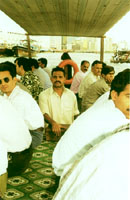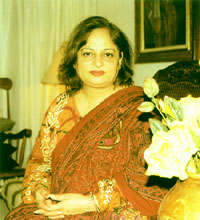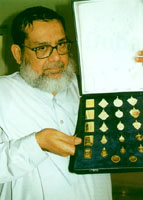Pakistanis In Dubai
Dubai is host to an amazing mix of nationalities and in our continuing series Zac Sharpe looks at the British
 Like many Pakistanis before her, Nighat Akhtar accompanied her husband and young family to Dubai in search of money which could make for a more comfortable life. But the salve which soothed life away from family and friends came to her not in the form of money, but in art and flowers. The sudden death of her beloved 24 year old sister in the mid 1980s was the catalyst for a birth of a different kind. Seeking solace from the tormenting loss, Nighat answered a small advertisement in a local newspaper to join an art class.
Like many Pakistanis before her, Nighat Akhtar accompanied her husband and young family to Dubai in search of money which could make for a more comfortable life. But the salve which soothed life away from family and friends came to her not in the form of money, but in art and flowers. The sudden death of her beloved 24 year old sister in the mid 1980s was the catalyst for a birth of a different kind. Seeking solace from the tormenting loss, Nighat answered a small advertisement in a local newspaper to join an art class.
Since that fateful day, the Jumeirah International Art Centre has been a home away from her Deira home. A competent potter, painter and embroiderer, Nighat found her true vocational in the delicate realm of ceramics and porcelain sculpting. Drawing upon years of pleasure derived from visiting the world's great botanical gardens during her husband's decades-long tenure at sea, she paired her love of flowers with an acute eye for detail to create startlingly life-like porcelain roses and other carnations.
"I originally joined for just one art class as a means of diverting my attention from my own grieving and crying over the loss of my sister," she confessed. "The feel of the flowers is so soothing and calming. I was hooked straight away." Today, after 18 years resident in the United Arab Emirates, the former Karachi schoolgirl is now a respected teacher and studious pupil at the very establishment she first visited all those years ago. Her love of porcelain has taken her on odysseys to the other side of the world to learn from the masters of the craft. Italian artist Nino Gallabo was, and remains, the most aspirational of talents to influence her work. In order to learn from the best in her field, Nighat travelled to Virginia in the United States to study under the foremost name in porcelain sculpture.
"He has such a great command of colour and his work is so intricate," she exclaimed. As well as improving her technical skills, she drew much confidence from his reaction to her own delicate floral recreations. "He really loved my work which encouraged me to continue to learn more about the craft and too delve into other art forms, such as watercolours, to improve my understanding of painting and colour," said Nighat.
As a devout Muslim and sincerely happy wife, Nighat attributes her success to inspiration from regular readings of the Holy Quran and the tireless support of her number one critic and biggest fan, engineer husband Akhtar Siddiqi. "The Quran helps me to focus on the beauty of nature that god has provided," she said. "And my husband has done everything to support me," she added. "Unlike many Pakistani husbands who like their women to be domesticated, my husband has supported my love of art to the fullest. I don't drive so he has driven me to classes and allowed me to travel," she said.
This same determination to succeed has also been evident in her personal life and ultimately rubbed off on her two daughters. Akhtar, a Karachi-ite of Indian descent, and Nighat defied convention in their native Karachi by marrying for love and not through acquiescence to a parental arrangement. "It created quite a stir but we are so happy still because we have an
understanding of each other," she said.
 The cosmopolitan demography of Dubai has also helped nurture their contemporary attitude to family life, she admits. Both of her daughters have pursued careers in art with the eldest now married and living in the US as a professional ceramicist while 18 year old Nida is studying towards a visual communications degree at the American University in Dubai.
The cosmopolitan demography of Dubai has also helped nurture their contemporary attitude to family life, she admits. Both of her daughters have pursued careers in art with the eldest now married and living in the US as a professional ceramicist while 18 year old Nida is studying towards a visual communications degree at the American University in Dubai.
"The quality of life here is something that is unattainable in Pakistan, although we do have a lovely house there. You have good hospitals, confidence to bring your children up with security and a lovely city to live in," Nighat enthused. "Nida has studied ballet, goes to the gymnasium and aerobics and is a talented equestrian rider. Those sort of opportunities simply would not be available for her in Karachi," she concluded.
"While we live here, we return to Pakistan every two or three months to visit our family. Pakistan does have its own advantages, such as a free press and the art scene is really blooming. Perhaps the biggest negative of life in Dubai is that money seems to be the only God."
Upon arriving in Dubai 30 years ago, money certainly proved to be a god-send for Haji Abdul Razzak. A young boy when he decided to leave his homeland of Pakistan, Haji set sail for the little known trading post of Dubai. Rumours of riches to be made selling imported goods from Japan and the Orient to Indian smugglers lured the intrepid lad to a Gulf state without running water, modern technology or a transport infrastructure.
Despite leaving school without gaining his matriculation, Haji enjoyed a continued series of successes which has culminated in his heading the largest jewellery company in Dubai. Today, as chief executive and managing director of ARY Traders, the same self-taught business entrepreneur owns and controls a company with gold, money exchange and general trading interests which in 1997 generated a turnover of US $1.5 billion.
The once humble textile merchant leading a hand to mouth existence in a remote outpost is now looking to expand his wholesale jewellery enterprise into the unchartered waters of Europe and the United States. "I left Karachi with a friend and arrived in Dubai in 1969 empty-handed. I was married but it was not until 1974 that my family could join me in the emirates," said Haji.
Despite living in Dubai for 30 years and raising five daughters in the now modern metropolis, Haji still refers to Pakistan as home. "I can now choose to travel where I please and live where I choose," said the self-made millionaire. "But I still call Karachi home. Although my parents have passed away my brother still lives there and I return there regularly for business and pleasure," he said.
 While the path he has trodden in Dubai has literally been paved with gold, recent downturns on the gold market and deregulation of importation laws in India have ensured the business world throws up its share of challenges to Haji. Since the halcyon period up to 1997, turnover has almost halved. In 1998, as the gold price plummeted in the wake of international governments off- loading their huge reserves of gold bullion, turnover fell to a comparatively low $US 750 million.
While the path he has trodden in Dubai has literally been paved with gold, recent downturns on the gold market and deregulation of importation laws in India have ensured the business world throws up its share of challenges to Haji. Since the halcyon period up to 1997, turnover has almost halved. In 1998, as the gold price plummeted in the wake of international governments off- loading their huge reserves of gold bullion, turnover fell to a comparatively low $US 750 million.
Unfazed, Haji has steered ARY into the west, attracting enough business from Europe and the US to contemplate expansion into those markets. "We are now looking at opening an office in London and another in the States," he said. "People on the sub-continent still love gold and will continue to use it to save money because it continues to outstrip the local currencies in terms of appreciation."
"But we are now moving towards manufactured gold products to attract people to gold rather than relying on them buying bullion as an investment." This year saw the launch of 24 carat pure gold pendants which, although manufactured in Switzerland, avoid a four percent luxury tax levied on jewellery imports because the chain hook is produced locally. Such business acumen has kept Haji one step ahead of the market swings and his latest foray into the realm of the consumer has been timely. With Dubai's escalation as a travellers' destination, tourists have taken over where investors and speculators have left off and today account for about half of ARY's turnover.
Although he praises Dubai as "a great place to do business if you do nothing wrong according to the law", expansion into Europe or across the Atlantic could lure him from Dubai. "I will live where the business takes me," he said simply.
Travelling for business is a fundamental part of the working life of 35-year-old Lahore expatriate Mohammad Yousaf - even if his travels constitute daily criss-crossing of the Creek in Dubai. For two years Yousaf has driven passengers on his wooden water taxi, or abra, the couple of kilometres across the waterway which threads itself through the heart of Dubai. To his regular passengers, Yousaf is as much an icon of Dubai as his diesel-powered abra.
Although an estimated 12,000 one-way journeys across the Creek in two years only qualify him as a comparative novice up against some of his long-serving, twenty year work colleagues, it does position him as something of an expert in his particular discipline of the shipping industry.
But unlike any other ship captain, when something goes wrong, there is no junior apprentice to whom he can delegate the repair work. "The biggest problem is getting plastic bags stuck in the propeller. When this happens I have to jump overboard and untangle it all myself," Yousaf
explained.
Like the other 280 drivers plying the Creek's abra-lanes, only ten of whom are Pakistani, Yousaf was first lured to Dubai by the prospect of supporting his family on a salary he could not aspire to in his home country. Although he is loathe to admit it is upsetting in any way, separation from his wife and three young children, aged ten, seven and five years of age, was the price he had to pay in relocating to Dubai to provide for them. "I see my family once a year when I go home for holidays," he said. As an embroiderer in a small shop in Lahore, Yousaf would earn a total of 300 dirhams each month. After deducting humble living expenses for himself and family, there would be nothing left, if enough to survive on at all.
His eagerness to stay in Dubai and selflessly provide a better life with more promising opportunities for children is reflected in the relatively high income he commands here for his six day working week. "Saving money was impossible for me in Pakistan. In Dubai I am able to save about 10,000 rupees a month (approx Dh 800)," he explained. "Of course, if I could earn the same amount in Pakistan, why would I be here but Dubai is a good place to be."
Like all expatriate employees in the UAE, Yousaf has a sponsor who allows him to obtain a residency visa and use the abra. For the privilege, Yousaf pays 25 fils from each 50 fils he receives from a Creek-crossing passenger to the sponsor. From his own 25 fils he draws an income from what is left after paying the bills for maintenance and diesel for the abra which is his livelihood. For the prospective abra drivers reading this article, getting a licence was not an expensive or particularly trying episode, according to Yousaf. Unlike the driving test in Dubai which is fabled for its unrelenting failing of learner drivers, often for years at a time for each student, the abra exam was a relatively simple affair.
"Someone gave me a visa and I came here to sit the test for the abra licence because I had heard about it from a friend. It only cost 30 dirham for the licence and I didn't have to pay any extra for the tests. Passing the police test was quick and easy, too," he enthused as he described the bureaucratic process during his estimated 12,001st trek across the Creek.
As a public face of Dubai, Yousaf has many friends. A day away from the water will find him either sleeping or spending the day in one of the many parks in Dubai or browsing in a large shopping centre. "It is good to be here, but the biggest drawback to living in Dubai is the cost of accommodation. In Karachi I would have my own room but here we all have to share with three or four other strangers. There is very little privacy," Yousaf said.
But simple economics brutal reality. When asked how long he would remain in Dubai, Yousaf's matter-of-fact reply was, "As long as Dubai lets me stay here."